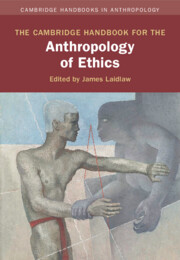Book contents
- The Cambridge Handbook for the Anthropology of Ethics
- Cambridge Handbooks in Anthropology
- The Cambridge Handbook for the Anthropology of Ethics
- Copyright page
- Contents
- Contributors
- 1 Introduction
- Part I Intellectual Sources and Disciplinary Engagements
- Part II Aspects of Ethical Agency
- Part III Media and Modes of Ethical Practice
- Part IV Intimate and Everyday Life
- 22 Care
- 23 Kinship and Love
- 24 Cooperation and Punishment
- 25 Favours
- 26 The Inimical Gaze
- 27 Animals and More-Than-Representational Ethics
- 28 God
- Part V Institutional Life
- Index
- References
24 - Cooperation and Punishment
from Part IV - Intimate and Everyday Life
Published online by Cambridge University Press: 11 May 2023
- The Cambridge Handbook for the Anthropology of Ethics
- Cambridge Handbooks in Anthropology
- The Cambridge Handbook for the Anthropology of Ethics
- Copyright page
- Contents
- Contributors
- 1 Introduction
- Part I Intellectual Sources and Disciplinary Engagements
- Part II Aspects of Ethical Agency
- Part III Media and Modes of Ethical Practice
- Part IV Intimate and Everyday Life
- 22 Care
- 23 Kinship and Love
- 24 Cooperation and Punishment
- 25 Favours
- 26 The Inimical Gaze
- 27 Animals and More-Than-Representational Ethics
- 28 God
- Part V Institutional Life
- Index
- References
Summary
This chapter focuses on questions related to human cooperation, focussing in particular on punishment as a means of enforcing cooperation. We take child development processes as a means to investigate this, drawing on fieldwork material from China and Taiwan. As anthropologists would expect, we find that: (a) cooperation is not only a cultural phenomenon but also a historical and political one; (b) reciprocity is a key feature of human cooperation, but the manifestations of this in particular fieldsites are highly variable and sometimes surprising; and (c) cooperation in one domain of life tends to spill over into other domains of life. As noted, however, we go beyond standard anthropological accounts of cooperation by adding a set of questions regarding punishment and child development – questions that, in turn, may help bring the anthropological study of cooperation into closer dialogue with work being done by scholars in other disciplines on this important topic. The goal is to develop comparative questions about ethical life: ones anchored in species-level understandings of what it is to be human and to engage in human cooperation.
- Type
- Chapter
- Information
- The Cambridge Handbook for the Anthropology of Ethics , pp. 610 - 628Publisher: Cambridge University PressPrint publication year: 2023

